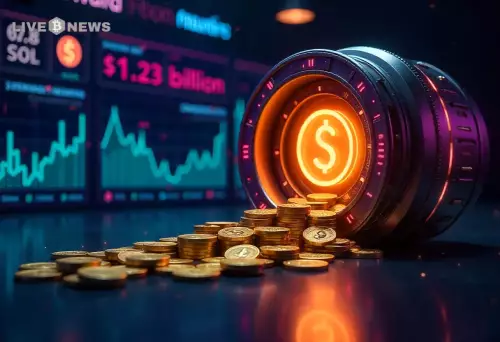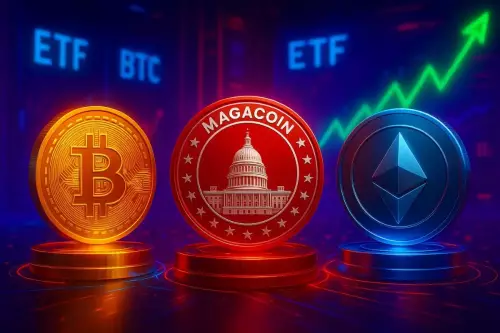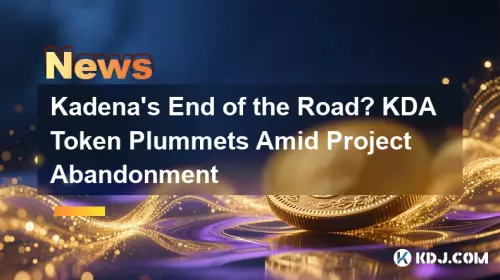 |
|
 |
|
 |
|
 |
|
 |
|
 |
|
 |
|
 |
|
 |
|
 |
|
 |
|
 |
|
 |
|
 |
|
 |
|
암호화폐 뉴스 기사
Decentralized Science (DeSci) Is Expected to Achieve Significant Growth by 2025, Driven by Utility Memecoins
2024/12/25 18:07

output: A recent report by MV Global anticipates substantial growth in decentralized science (DeSci) by 2025, largely driven by the rise of utility memecoins.
DeSci entails the integration of blockchain technology into scientific research endeavors. It aims to revolutionize the traditional scientific ecosystem by enhancing transparency, decentralization, and collaboration.
The report highlights that while the concept of DeSci is not entirely new, the focus and scope of these initiatives have shifted over time.
Initially, most DeSci projects primarily focused on providing research funding through decentralized autonomous organizations (DAOs). Some well-known examples that continue to play a significant role in the DeSci space include VitaDAO, HairDAO, and AxonDAO.
However, the field has since evolved to become more diverse, encompassing a broader range of use cases.
The report highlights a diverse spectrum of applications across approximately 30 active projects, including research funding, health data management, and open source research initiatives, showcasing the growing maturity and adaptability of the DeSci ecosystem.
DeSci initiatives collectively aim to foster a more inclusive and decentralized scientific ecosystem, enabling researchers and communities to engage in collaborative innovation, largely unconstrained by the limitations imposed by centralized institutions.
Notably, the report also identifies a trend for 2024: the emergence of DeSci-specific memecoins. While most programs have had limited success, two programs, Rifampicin and Urolithin A, have achieved notable development, with market capitalizations of approximately $73 million and $59 million, respectively.
These tokens were launched through the Pump.Science platform and, according to MVGlobal’s assessment, their utility far exceeds that of traditional memecoins. Tokens are directly tied to scientific experiments, representing specific compounds or interventions tested on organisms such as worms, flies, and mice.
These tokens can serve multiple functions: they contribute to funding research, provide real-time updates on experimental progress, and facilitate transactions based on research results. Notably, holders of these tokens can even sell the rights to successful interventions, forging a tangible link between token ownership and real-world scientific progress.
MV Global anticipates Pump.Science to achieve significant expansion in 2025, with at least 10 projects expected to have a market value of more than $100 million by the end of the year.
MV Global also predicts that health data management and open source collaborative research will also see significant growth by 2025. Projects like Hippocrat, which gives individuals the power to control their own health data, and ResearchCoin, which aims to build a “GitHub for scientific research,” are promising.
The market valuation of these two projects is expected to reach at least US$200 million by 2025.
The report also predicts a significant increase in DeSci projects, with at least 50 expected to be listed by the end of 2025. This growth is fueled by positive market sentiment and increased liquidity in the sector.input: A recent report by MV Global anticipates substantial growth in decentralized science (DeSci) by 2025, largely driven by the rise of utility memecoins.
DeSci entails the integration of blockchain technology into scientific research endeavors. It aims to revolutionize the traditional scientific ecosystem by enhancing transparency, decentralization, and collaboration.
The report highlights that while the concept of DeSci is not entirely new, the focus and scope of these initiatives have shifted over time.
Initially, most DeSci projects primarily focused on providing research funding through decentralized autonomous organizations (DAOs). Some well-known examples that continue to play a significant role in the DeSci space include VitaDAO, HairDAO, and AxonDAO.
However, the field has since evolved to become more diverse, encompassing a broader range of use cases.
The report highlights a diverse spectrum of applications across approximately 30 active projects, including research funding, health data management, and open source research initiatives, showcasing the growing maturity and adaptability of the DeSci ecosystem.
DeSci initiatives collectively aim to foster a more inclusive and decentralized scientific ecosystem, enabling researchers and communities to engage in collaborative innovation, largely unconstrained by the limitations imposed by centralized institutions.
Notably, the report also identifies a trend for 2024: the emergence of DeSci-specific memecoins. While most programs have had limited success, two programs, Rifampicin and Urolithin A, have achieved notable development, with market capitalizations of approximately $73 million and $59 million, respectively.
These tokens were launched through the Pump.Science platform and, according to MVGlobal’s assessment, their utility far exceeds that of traditional memecoins. Tokens are directly tied to scientific experiments, representing specific compounds or interventions tested on organisms such as worms, flies, and mice.
These tokens can serve multiple functions: they contribute to funding research, provide real-time updates on experimental progress, and facilitate transactions based on research results. Notably, holders of
부인 성명:info@kdj.com
제공된 정보는 거래 조언이 아닙니다. kdj.com은 이 기사에 제공된 정보를 기반으로 이루어진 투자에 대해 어떠한 책임도 지지 않습니다. 암호화폐는 변동성이 매우 높으므로 철저한 조사 후 신중하게 투자하는 것이 좋습니다!
본 웹사이트에 사용된 내용이 귀하의 저작권을 침해한다고 판단되는 경우, 즉시 당사(info@kdj.com)로 연락주시면 즉시 삭제하도록 하겠습니다.






























































